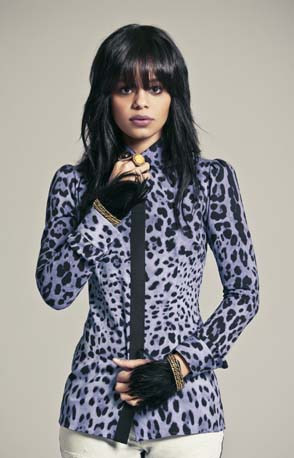Fefe Dobson is back with new music, our interview with the Singer
“Sometimes Pop, sometimes Rock,” is what you would hear if you ever got a chance to kick it with Fefe Dobson as I did and ask her to describe her personality and what she wants people to walk away with after listening to her sophomore album Joy . Life as well as the industry has not been a cake walk for Fefe; since coming into the game at the age of 18 on the heels of a self-titled album which reached #1 on the Heatseeker charts and moved roughly 310,000 units, label issues have at times stagnated her career but never were those tribulations able to dampen her passion for the art form which she loves—MUSIC. A self professed alter-ego is what drives the records on Joy, as she is finally able to embrace who she really is. Long gone are the days when her vision was not shared by all involved with her career and music.
Growing up in Scarborough, a suburb outside of Toronto, Fefe Dobson had a strong R & B influence as well as a strong Rock influence. In one room you could hear Lisa Lisa and the Cult Jam, or the Bee Gees and quite possibly Michael and Janet Jackson. A trip down the hall would bring the sounds of Nirvana and Smashing Pumpkins; all of which have shaped the foundation of Fefe as an artist. No longer confined by criticism, nay-sayers, or categorization, the 24 year old is now able to just be FEFE. She has matured over the years and revitalized her sound and approach. “I was able to go and find myself musically,” Fefe explains. Her fans, I am sure will be proud of that.
A second go around with her orignal recording home Island Music Group, along with a re-newed faith in herself and her team has put Fefe on the track that she originally anticipated of living her dream. No longer the precocious 18 year old, Fefe is now a seasoned vet. More positive as she attests to of her own volition, she has let the times change, situations as well but not her personality. Rock is still her foundation, and writing/performing is still her love.
Get re-introduced to the artist as if it is the first time, as I Parlé with Fefe Dobson.

Parlé Magazine: Which one your hats do you enjoy the most: model, singer, guitarist or songwriter?
Fefe Dobson: If I had to say, I would choose singer/songwriter. Its what I do and I believe that as an artist the two actually go hand in hand for the most part. I like to write what I think and sing what I write.
Parlé: Describe for us the emotions you went through and some of the tribulations around the time that Sunday Love was being recorded and the Island Records issues.
Fefe Dobson: When I was let go from Island I was heartbroken. I felt like my world was crushed. Here I was a teenager from the suburbs of Toronto with this dream. A dream of making music, and when I was signed I felt like I was gonna be able to live out my dream, and share my music with the world. I was to the point where I had nothing, we’re talking somewhere around $500; no boyfriend, nothing. I ended up buying a dog, as I was overwhelmed by sadness and confusion. At that time my best friend consoled and supported me and reminded me that everything happens for a reason. As time went on, I felt a change. A change in my perspective. I became more positive, and my outlook was positive. I began to think what’s my next step. The detachment also gave me time to refine myself personally and musically.
Parlé: Why do you mark John Lennon and Judy Garland as your biggest musical influences
Fefe Dobson: John Lennon is so influential because of his words and his music. My admiration for him helped when I was dropped. He saved me. His strength and the way he saw the world, it helped me stay positive. And as fas as Judy Garland is concerned, one of the first motion pictures I can remember is The Wizard of Oz, and it actually became the first play I ever participated in. I became fascinated with her life, and some of the tragedy. Here she was—mysterious personally; dealing with so much tribulation and pain , yet when it came to the screen, you get The Wizard of Oz, and the idea of somewhere over the rainbow, which is a classic. It made me think of people’s lives and how interesting they are
Parlé: How did you feel about the early stigmas as a R&B singer instead of a rocker?
Fefe Dobson: I felt like there was something wrong with people not accepting me for who I am, and coming from where I come from—that being Toronto. I wasnt happy with being categorized. I always felt like it wasn’t about my creativity or my influences, which is what I wanted the focus to be. The people whom were in my corner at that time did not share the same visions that I had career wise. It was a relief when I met my current manager, and team of producers. I felt like they did. In addition, I felt like Island did.
Parlé: Throughout the years people have always questioned whether a Black female artist can succeed in this genre. What concerned you the most about this doubt?
Fefe Dobson: Personally I don’t understand how race, gender, preference of any kind can control people’s opinion of you. Also I don’t understand how some people can let those that doubt influence whether or not they reach for their dreams. Me and my team have progressed. I stay positive. My energy and foundation will always be Rock-n-Roll. I am creative, I may make a country song or a reggae song, but you will always hear my foundation.
Parlé: What compelled you to start writing lyrics more so than compositions, as I see you were an instrumentalist at a young age.
Fefe Dobson: When I was young times were hard so I played the instruments but accessibility was not always there. Over time, life just took over and I developed a passion for writing what I felt. I play with melodies. When I experience such strong emotions in my day-to-day, I write. I find myself writing a lot about Love.

Parlé: Talk about “Stupid Little Love Song,” which is the song that originally got you signed, catching the attention of Lyor Cohen and Jeff Fenster.
Fefe Dobson: The theme behind “Stupid Little Love Song” was me being honest about me interest that I didnt have much to offer. I’m the odd ball in most instances and hopefully with this song, they would notice me now. When he first heard it Lyor Cohen thought it was titled “Stupid Little Buzz Song’ and he loved that idea. I had to clarify for him and luckily he still was thrilled.
Parlé: How were you able to cope with the early success, your debut self-titled album hit #1 on the Heatseekers chart.
Fefe Dobson: I couldve let the fame or popularity get to my head but its hard when you still come home and your family is normal; they still have issues. Reality is something you still deal with. I grew up fast and had to deal with alot. Regardless of what was going on or who I was touring with, be it Justin or Lenny Kravitz I still came home and identified with the same people I always had.
Parlé: Tell us about the new album Joy.
Fefe Dobson: The album is about my alter ego and the joy of being able to express both sides of my artistry. Growing up I had two influences in my home. My mom played Lisa Lisa and the Cult Jam, the Bee-Gees, and artists like that while my sister played Nirvana and Smashing Pumpkins. Both had an affect on me and the music I make. It has become me. Sometimes I am strong and aggressive, sometimes I am sensitive. Sometimes I am POP, sometimes I am ROCK. People will get to see that with this album as they let it play.
Also Check Out:
Model Nicole Iheme
Make Me Wanna Holler: Why Marvin Gaye’s 1971 Masterpiece Still Matters
Taboo – From The Beginning to The E.N.D.

